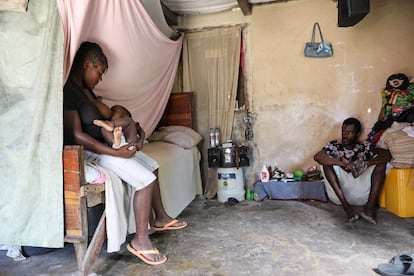The world is failing Haiti’s kids
Nearly half of the country’s five million people need urgent humanitarian aid, and three million of these are children and adolescents

In late June, Catherine Russell, UNICEF’s executive director, embarked on her second visit to Haiti. Her purpose was clear: listen, learn and galvanize international support for humanitarian aid. Russell’s first visit to Haiti was in 2010 after a catastrophic earthquake devastated the country. This time, she was faced with the stark truth that life for Haitian children has never been worse, while the world’s attention has turned elsewhere.
About half of Haiti’s five million people urgently need humanitarian aid, and three million of these are children and adolescents. The country’s institutions and basic services are critically strained, and the population is experiencing record levels of poverty. Severe and chronic malnutrition has risen by 30% over 2022.
The alarming reality faced by Haiti has been deteriorating in recent years. Numerous schools remain closed due to violence or structural damage from recurring natural disasters. The recent rains have damaged the residences of thousands of families, and an ongoing threat of cholera resurgence looms. Teachers, social workers and healthcare professionals are leaving the country, seeking safety abroad.
“Armed groups control a significant part of Port-au-Prince and the main routes to the country’s interior, instilling fear and hindering access to essential services.”
The prevalence of urban violence is noticeable on nearly every street corner. Armed groups control a significant part of Port-au-Prince and the main routes to the country’s interior, instilling fear in communities and hindering access to essential services.
During her visit, Russell spoke with an 11-year-old survivor of gender-based violence who told her how she was caught on the street by three men and raped. The girl was eight months pregnant when they spoke. Another woman told Russell how armed men broke into her home and raped her. Her 20-year-old sister was killed for resisting. Then they set fire to her house. It’s a cruel strategy of rape, murder and arson to make Haiti’s girls and women even more vulnerable.
The UNICEF team in Haiti also deals with the difficult task of navigating the streets controlled by armed groups. Some workers have had to move homes to avoid being kidnapped. Despite the insecurity, they always find ways to help the most vulnerable families, while collaborating closely with Haitian authorities and local non-governmental organizations.
UNICEF partners on the ground show extraordinary dedication, and go to great lengths to support children in need. However, unlike the assistance received during the 2010 earthquake, they now feel abandoned due to the international community’s apparent indifference.
In Haiti, every little effort has a significant impact on saving lives. UNICEF provides vaccines, therapeutic food for malnutrition, safe water, hygiene and sanitation resources, psychosocial support and protection for those who have experienced violence.
It’s crucial to allocate more humanitarian funding and promptly scale up efforts to address the urgent needs of the most vulnerable. We must simultaneously focus on establishing long-term solutions for rebuilding institutions and ensuring access to essential services. By fostering preparedness and resilience against natural disasters and epidemics, we can break the cycle of chronic crises and safeguard the well-being of children.
The lack of security is unacceptable. We must protect everyone who works in a humanitarian capacity. Schools and public spaces should be safe. Only through a national, inclusive dialogue with the Haitian people can we put an end to insecurity and establish lasting solutions.
The international community, and especially the European Union, plays a key role in mobilizing efforts to support Haiti’s children. There is much we can do to assist them, but current funding falls far short of the need. Less than 15% of the $246 million UNICEF needs for Haiti in 2023 has been received.
The world is failing the nearly three million vulnerable boys and girls in Haiti. They absolutely deserve the opportunity to grow into the adults they aspire to be. Unless we act now, it’s difficult to envision a positive future for them
Every morning, as I watch boys and girls radiating joy in their impeccable uniforms on their way to school, I am inspired and invigorated. Education, their most precious asset, empowers them to face each day with a smile. They embody the hope for a brighter future, where Haiti thrives as a fair, peaceful, and just society. The international community must not turn a blind eye, for we know that more can and must be done. Today, more than ever, Haiti’s children are relying on us.
Sign up for our weekly newsletter to get more English-language news coverage from EL PAÍS USA Edition
Tu suscripción se está usando en otro dispositivo
¿Quieres añadir otro usuario a tu suscripción?
Si continúas leyendo en este dispositivo, no se podrá leer en el otro.
FlechaTu suscripción se está usando en otro dispositivo y solo puedes acceder a EL PAÍS desde un dispositivo a la vez.
Si quieres compartir tu cuenta, cambia tu suscripción a la modalidad Premium, así podrás añadir otro usuario. Cada uno accederá con su propia cuenta de email, lo que os permitirá personalizar vuestra experiencia en EL PAÍS.
¿Tienes una suscripción de empresa? Accede aquí para contratar más cuentas.
En el caso de no saber quién está usando tu cuenta, te recomendamos cambiar tu contraseña aquí.
Si decides continuar compartiendo tu cuenta, este mensaje se mostrará en tu dispositivo y en el de la otra persona que está usando tu cuenta de forma indefinida, afectando a tu experiencia de lectura. Puedes consultar aquí los términos y condiciones de la suscripción digital.








































